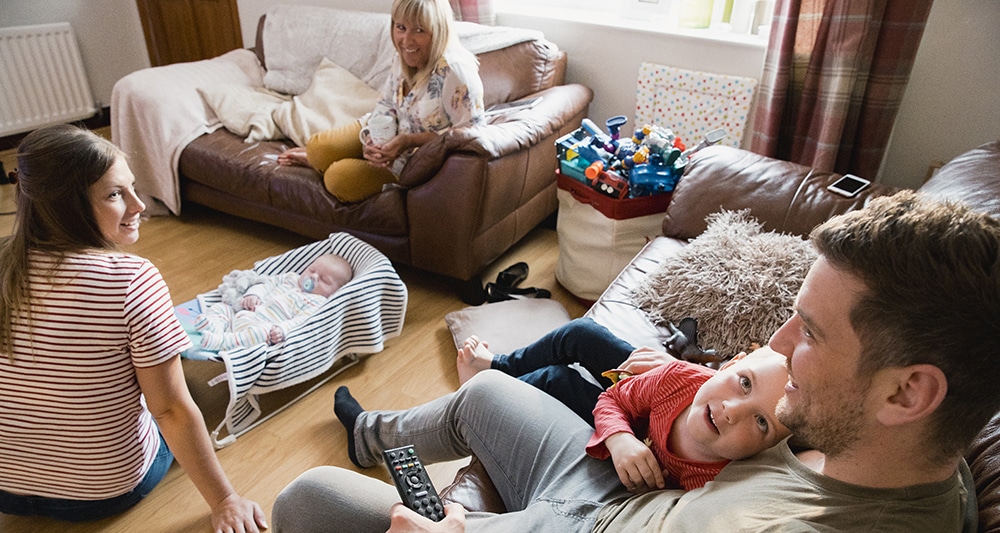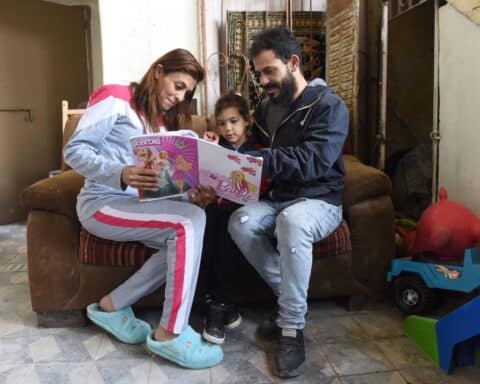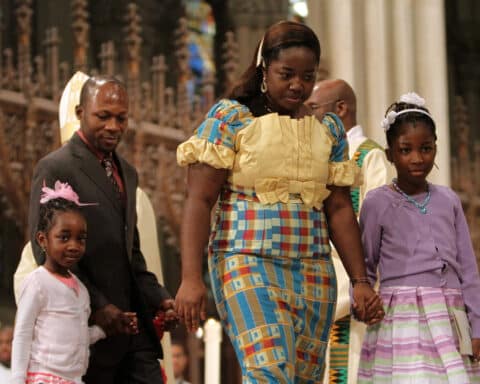Recently, the Pew Research Center came out with a study showing that fewer Americans intend to have kids than ever before. There’s a lot of data in the study, but the major points are this: 44% of non-parents ages 18-49 are not likely to have children. And 74% of those 18-49 who already do have children are not likely to have more. Those are staggering percentages with huge ramifications on our society and our Church.
So what can we as Catholics do to encourage and support the growth of families?
As a mom of four young children, I have some ideas.
Make programming accessible and affordable
Getting moms and dads connected at their parish is a key step in being able to provide them with the support they’ll need to raise their family.
My own parish found an elegant solution to this problem. Once a month, it hosts a Friday night event — the topics and format vary, but they are all geared toward adults. Beforehand, the Knights of Columbus cooks a dinner for the attendees and their families. Families sit together around big tables and enjoy fellowship with each other. After dinner, the kids are taken off to their own special event — games, crafts and activities for multiple age ranges, under the supervision of babysitters. All of this is free to parents.
Why this is a game changer: Nights out for parents are hard to come by, and the more children you have, the more expensive and complicated it gets. This type of activity can make it possible for parents to socialize, grow in their faith and get out of the house. Not to mention, they have the opportunity to build relationships during a season when they are desperately needed.
What kind of NFP are you offering?
Natural Family Planning (NFP) is something that the Catholic Church offers to couples, but providing the training and support is something that is often overlooked at both the diocesean and parish levels.
Time and time again, NFP has been proven to not only help couples grow in their openness to life, but also to form their hearts, making self-sacrifice part of their daily lifestyle. This is key in building a strong foundation for a family of any size.
What can your parish do? Gather a list of local teaching couples in the major methods (Creighton, Sympto-Thermal, Marquette) so that you have contact points for parishioners who come looking. Host an NFP showcase night (see the aforementioned idea for making the night accessible and affordable) or, even better, host full training courses at the parish. Find ways to pay for these or have scholarships available for couples who can’t afford them. And finally, offer training and support for postpartum NFP. Hormones and cycles change drastically after a baby is born, and many couples feel adrift at the moment when they most need help.
How are we forming hearts and minds?
Real talk here: Raising a large family — and to some degree, raising any family — in today’s society is countercultural. How are we as a Church equipping families (and the people supporting those families in their mission) to do that?

Catholics do well when it comes to explaining Church teaching about abortion and supporting pro-life ministries geared toward supporting pregnant women and new moms. But being pro-life is bigger than being simply pro-birth. Do we need to be diving deeper into some of the other pro-life issues that affect families? One simple way would be adding a study on encyclicals like Rerum Novarum (on capital and labor) or Laborem Exercens (also on human work), which many Catholics are unfamiliar with, to the schedule.
Mealtrains: A simple and practical blessing
Honestly, this one is the simplest to accomplish and has huge payouts. Providing meals for families who have just had a baby, families with a child in the hospital or families going through a particularly rough patch for whatever reason, is a brilliant way to say, “We see you, you matter, we are behind you.” There are several different websites that make this a breeze to set up, and with the right framework in place, they require little work on the organizer’s part.
Where are the alloparents?
Alloparenting is a term that is unfamiliar to most Westerners, but it is a concept we could really use right now. It means to care for a child that is not biologically your own, not in your direct family line. Around the world, indigenous cultures make use of alloparents, to provide love, support, structure, even discipline to children. The task of raising children doesn’t fall solely on the parents. Other adults can provide emotional and boots on the ground help to parents by being in relationship with them and their children.
There was a Sunday when I was alone at Mass with my (then) three kids. Our eldest son was having a lot of trouble sitting still, and the baby wanted to nurse. Without saying a word, our deacon’s wife slid into the pew beside us, pulled my son onto her lap, and proceeded to let him rifle through her purse, keeping him quiet and occupied. There was no judgment, no castigation of my parenting ability, just love. That right there is an example of alloparenting on a parish level.
Is there a way that your parish can create ways for older parishioners, single people or families with older children to “adopt” younger families, welcome them in and walk alongside them?
Witness, witness, witness
As Catholics, we are often used to sharing our testimony, our faith story, but I would challenge all parents to become more accustomed to sharing their parenting story in the same way. The most encouraging thing for a new mom to hear is that other women have struggled. The most comforting thing for a couple trying to figure out if another baby is the right choice for their family is that other couples they know and respect have wrestled with that same question. Let us be more open and honest about both the immense joys and wonders of parenthood and also the struggles and challenges.
The fact that more and more Americans are less likely to have children is a complex problem that won’t be solved quickly or easily. What I hope though, is that by putting real, practical solutions forward for implementation, we can start changing the world (and the birth rate), one relationship at a time.
Colleen Pressprich is the author of “Marian Consecration for Families with Young Children” (OSV, $18.95). She writes from Michigan.





